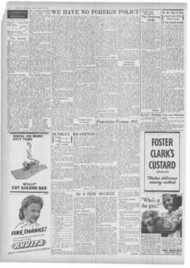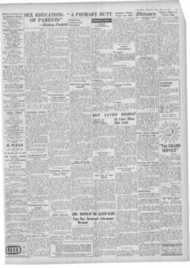Page 1, 26th May 1944
Page 1

Report an error
Noticed an error on this page?If you've noticed an error in this article please click here to report it.
Tags
Share
Related articles
The Missing Passage In Censored Belgian Pastoral
Belgium And The War
" Our Lady Of The Waves"
Danger Of Russia
Nazis Punish Belgians
"STOP BOMBING US"
Primate's appeal to Allies reported on Belgian Radio
Cardinal van Roey, Belgian Primate, has added his voice to that of the French Hierarchy in appealing against the Allied bombing policy in occupied countries.
The Cardinal's protest in regard to Belgium has been broadcast on the Belgian Home Service. but it is uncertain how far this radio version corresponds to the original text which was read in Belgian churches last Sunday.
A Belgian priest in London who knows the Cardinal personally has told THE CATHOLIC HERALD that the radio text sounds like a summarised and edited version, as the phrases are more direct and cruder than is usually the case with the Cardinal's writings. On previous occasions Cardinal van Roey's, words have been distorted by Axiscontrolled propaganda.
gELG1AN RADIO VERSION
The Belgian radio version in Flemish is as follows:
This letter is an urgent appeal and, at the same time, a ptotest against the terrible air . bombardments of our country. It is addressed to the Governments of the British Empire and the U.S.A. It is also addressed to Allied public opinion, and particularly to the Belgian citizens who live in Britain and in the U.S.A. I hope that the responsible powers will hear my appeal, which I am addressing less to their sense of pity than to reason and commonsense.
For nearly a month Belgium has been the target for constant day and night air attacks, with the avowed object of destroying railway stations, railway centres and railway installations, The methods of carrying out these attacks every time cause fresh streams of blood and irreparable destruction in our towns and rural districts. Thousands of our countrymen have already found their death under the ruins of their houses and under the collapsed shelters, where they thought themselves safe.
Entire districts of some of the most beautiful towns of our country, like Brussels, Liege, Ghent and Charleroi, are heaps of ruins. Of other towns, like Wines and Louvain, lane third, or even half. has been destroyed, as I have been able to ascertain personally. The destruction includes some of their precious monuments. Death and despair reign over nearly the entire area of our country.
RANDOM BOMBS We are told that these results, though most regrettable, are an unavoidable corollary of war operations whose object is to destroy the enemy's means of transport and his factories. The reality however which we see with our own eyes is that, except in the few cases when a small number of aircraft operating in daylight hours have hit their targets, the bombs were dropped at random in the centre of densely populated districts.
()n the French version the following sentences were added: Is it really necessary, in order to hit railway installations, that air formations should drop hundreds and thousands of heavy bombs on a whole town, especially by night ? We are also being told: "Do not HNC near railway stations and railway lines." But where is a large population to take refuge ?) The Flemish broadcast continued: In nearly all towns the population, aware of the inescapable danger threatening them day and night, is filled with deathly atmosphere of panic. At such a terrible moment, I urgently appealto the reason and conscience of the responsible leaders. In the name of Belgium, I ask them to spare the private possessions of the citizens, as otherwise the civilised world will one day call to account those responsible for the terrible treatment dealt out to an innocent and loyal country. (Next sentence indistinct.)
blog comments powered by Disqus







